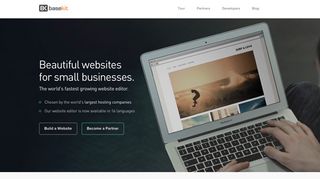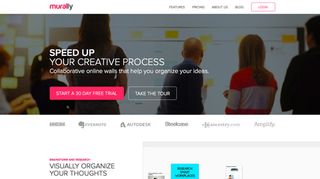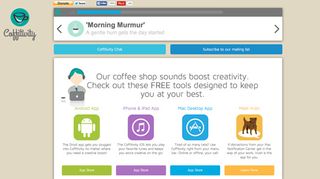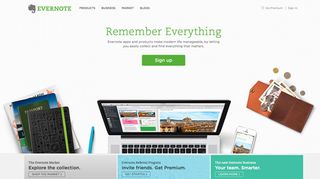Productivity hacks for web designers
Founder of Basekit Richard Healy explains how a little bit of noise and eating a frog every day can increase your work output.

Ernest Hemingway composed his masterpieces during the wee hours of 5 and 6am. Richard Branson is known for clocking in around 5.45am. And Disney CEO Robert Iger is up by 4.30am. If you've read any of the thousands of 'How to be successful, brilliant or filthy rich' articles out there, you'll have noticed that CEOs are quick to extol the virtues of a morning meditation session, followed by a four-mile run, finished up with a healthy breakfast.
If, like us however, your morning routine generally consists of a quick wash, a run to the bus stop (well, it is exercise after all!) and a hastily quaffed grande latte, fear not! It is possible to increase your work output without having to resort to such eye-wateringly early alarm calls.
Get inspired – fast!
You can't force creative genius. But when faced with a looming deadline or a client breathing down your neck, it can sometimes help to have a carefully curated line-up of the usual online suspects to dip into for visual inspiration.
Undertaking a new branding project? Check out Brand New, which features and critiques corporate and brand identity work. It also conveniently lets you search via industry type.
Font of the Day offers a daily dose of typography from across the web, not only posting hundreds of noteworthy choices, but also including links to where you can download your top picks. The best part? Most of them are free!

One of our favourite collections of design ideas can be found on Another Pony. Made by three Hamburg designers, it features several unorthodox pieces as well as branching out with links to their individual portfolios on behance.
Next, wall it up – virtually. Nothing beats being able to view a beautiful panorama of the designs you love, and Mural.ly gives you just that. This allows design teams to share virtual walls brimming with graphic tidbits they've collected. If you're a lone ranger, it's equally as ideal for arranging your personal thoughts about design direction.
Get the Creative Bloq Newsletter
Daily design news, reviews, how-tos and more, as picked by the editors.
Silence is a no-go
By now, most creatives understand the benefits of listening to classical music for getting those innovative juices flowing. (Here are 16 amazing classical compositions that will inspire you.) But if the thought of Canon in D on repeat seems a little tedious, a 2012 study from the University of Illinois suggests that any moderate background noise, whatever that be, offers enough distraction to trigger abstract thinking.
We're talking the bustle of a coffee shop, a quiet radio or muffled TV noises from another room. Note the word moderate, however. Complete silence is a no-go, as is Skrillex played at high volume (although we highly recommend it for the gym!). Coffitivity is a multi-device tool that offers a range of coffee shop sounds, from the gentle hum of ‘morning murmur’ to the bustling chatter of ‘lunchtime lounge’.

White noise is also surprisingly effective. Such dulcet, non-descript tones calm the nerves and help to promote focus. There are numerous free white noise generators available, but we particularly like the White Noise Box iPhone app, and White Noise Light (downloadable on both Apple and Android devices).
If you want the whole shebang, Noisli not only provides white noise, coffee shop chatter and nature sound effects, but is ideal for those with a second monitor as it also offers a colour generator to stimulate creativity - think blue for creative performance or red for nitty gritty detail work.
Put off procrastinating
For those of us with little or no willpower in the office, website blockers are the cold-turkey solution to our Twitter and Buzzfeed addictions. Extreme? Yes. But in this cluttered online world of continuous information, sometimes a direct intervention is your best bet. StayFocusd for Chrome, WasteNoTime for Safari, and LeechBlock for Firefox are the therapists you need to get acquainted with.
RescureTime is terrifying and useful in equal measures
Download RescueTime for free to track exactly how you spend time on your computer. Set it and then go about your day as usual. At the end of every week you'll be given access to detailed stats on precisely where your time went, alongside a productivity score. Terrifying and useful in equal measures.
Eat frogs, respect the tomato and make lists
Whilst brainstorming your next client project, try continuously singing your favourite song and counting to 10 …then let us know how that turned out for you. Ever heard of cognitive load? In a nutshell, our working memory can only hold a limited amount of short-term information – much like computers. Too many programmes running and you find yourself working less speedily and less efficiently.
The web developer's impressive ability to manage multiple projects can often be their productivity crux. Solution? The Pomodoro (Spanish for tomato) technique is pretty darn good. Francesco Cirillo's salad-themed time management method uses a timer to break down periods of work into 25-minute intervals.
These 'pomodoro' sessions are separated by short breaks (the standard being 5 minutes). Every 4 sessions, take a longer breather of around 15-20 minutes. Pomodoro time management is based on the theory that frequent breaks can improve mental agility while lessening the mental burnout commonly associated with creative jobs.
The added bonus of course is that you can check your Facebook feed, catch up on Netflix or order from Amazon in the allotted downtime - sans the guilt. Use the Focus Booster app to stay on top of your sessions.
Mark Twain once said: "Eat a live frog first thing in the morning and nothing worse can happen to you for the rest of the day." Whilst we don't condone the daily consumption of poor little amphibians, he has a point. According to Brian Tracy's rather brilliant book 'Eat that frog', your hypothetical frog should be the most challenging task on your to do list - the one you're most likely to put off. Suck it up and get it done – having it sitting there, croaking all day will only drain you of energy and focus. So take a look at your list first thing every morning. Circle the frog. Then tackle it! Everything else by comparison will be a breeze!
Eat a live frog first thing in the morning and nothing worse can happen to you for the rest of the day
Speaking of lists, optimise them with web app Wunderlist. This free tool syncs across all your devices so you'll never have to sort through multiple notes jotted in multiple notebooks again. Lists can easily be reordered, shared, categorised and sub-categorised with set reminders and recurring to-dos.
The daddy of all personal organisers however, is arguably Evernote. Think of it as your digital filing cabinet for everything, and we mean everything. Scan and save a web page in its entirety in one click. Take written and voice notes away from the office and sync with your desktop. You can even tag your resources to appear in multiple folders much like blog categorisation. For some, Evernote is a little overwhelming. But for others it is the ultimate in paperless organisation.

Projects – whether solo or collaborative team efforts – needn't be a big unproductive mess. There are some great collaborative online project management tools out there such as Basecamp and Trello which are extremely easy to use and useful for tracking day-to-day tasks, whether for multiple large-scale enterprises or small freelance jobs.
We also recommend Atlassian's offering – JIRA, which is geared specifically towards teams of developers, product managers, doc writers and bug bashers.
So, if you find yourself short on time, short on focus or short on inspiration, don't despair. It's all part and parcel of the job, and can easily be remedied.
Words: Richard Healy
Richard Healy is founder of and vice president of design and technology at cloud-based online platform, Basekit.

Thank you for reading 5 articles this month* Join now for unlimited access
Enjoy your first month for just £1 / $1 / €1
*Read 5 free articles per month without a subscription

Join now for unlimited access
Try first month for just £1 / $1 / €1
The Creative Bloq team is made up of a group of design fans, and has changed and evolved since Creative Bloq began back in 2012. The current website team consists of eight full-time members of staff: Editor Georgia Coggan, Deputy Editor Rosie Hilder, Ecommerce Editor Beren Neale, Senior News Editor Daniel Piper, Editor, Digital Art and 3D Ian Dean, Tech Reviews Editor Erlingur Einarsson and Ecommerce Writer Beth Nicholls and Staff Writer Natalie Fear, as well as a roster of freelancers from around the world. The 3D World and ImagineFX magazine teams also pitch in, ensuring that content from 3D World and ImagineFX is represented on Creative Bloq.
